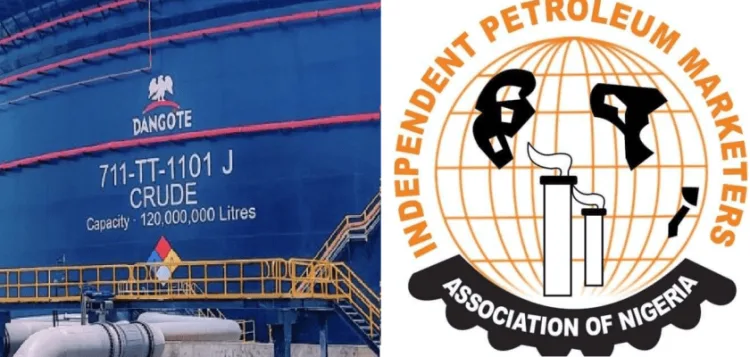The Independent Petroleum Marketers Association of Nigeria (IPMAN) has called on the Dangote Refinery to reduce its petrol prices. The association’s plea comes after the estimated cost of landing petrol in Nigeria dropped to N900.28 per litre, while the current ex-depot price remains at N970 per litre.
Chinedu Ukadike, IPMAN’s National Publicity Officer, stated that the request is in line with the principles of a deregulated market. He emphasized that a review of the ex-depot price would promote fair competition in Nigeria’s downstream sector.
Join our WhatsApp Channel“The cost of production is unique to each refinery, but with the drop in landing costs, it is logical to expect a reduction in prices,” Ukadike told reporters. “We have seen Dangote Refinery review its price twice, from N990 to N980 and now to N970. With the naira gaining recently, we believe a further review is possible.”
Naira-for-Crude Initiative Sparks Calls for Price Review
The Nigerian government’s decision to sell crude oil to local refineries in naira has been described as a game-changer for the oil sector. The initiative, which began in October, requires the Nigerian National Petroleum Company Limited (NNPCL) to supply 385,000 barrels of crude daily to the Dangote Refinery.
While the plan aims to stabilize petrol supply and reduce the impact of foreign exchange fluctuations on fuel prices, IPMAN’s demand for a price review signals that more changes are needed.
“The crude-for-naira deal is a healthy development,” Ukadike explained. “We are moving from issues of scarcity to issues of pricing, which is an improvement. The industry is evolving, and we expect the full benefits of deregulation to be realised over time.”
Production Shortfalls at Dangote Refinery Raise Concerns
The initial plan was for NNPCL to supply a minimum of 385,000 barrels of crude per day to the Dangote Refinery, but reports suggest the refinery has not received that amount. Vice President of Dangote Industries Limited, Devakumar Edwin, revealed that the volume of crude supplied so far has been insufficient.
“We need 650,000 barrels per day to fully utilize our production capacity,” Edwin stated. “NNPCL agreed to supply 385,000 barrels, but they have not met that target.”
READ ALSO: IPMAN Promises Affordable Fuel After Reaching Agreement With Dangote On Direct Supply
Due to the shortfall, Dangote Refinery has resorted to importing crude oil to maintain its production targets. This move has sparked debate over the refinery’s capacity to reduce petrol prices despite local crude availability.
IPMAN Pushes for Fair Competition in the Oil Market
IPMAN’s call for price reductions highlights the association’s role in ensuring fair competition in Nigeria’s deregulated petroleum market. Ukadike noted that the Nigerian Midstream and Downstream Petroleum Regulatory Authority (NMDPRA) deserves commendation for fostering competition and discouraging monopolistic practices.
“The regulatory body’s oversight is crucial in preventing monopolistic tendencies in the market,” Ukadike said. “Their role in ensuring fair competition allows for better pricing and efficiency, benefiting Nigerians in the long run.”
IPMAN’s intervention comes at a time when Nigerians are looking for relief from high fuel prices. Ukadike believes that the dynamics of supply and demand, coupled with production costs, should naturally result in lower prices for petrol.
Nigerians Hope for Relief in Festive Season
With the festive season approaching, many Nigerians are hopeful that IPMAN’s call for a price review will yield results. Fuel prices often have a direct impact on transport costs, which typically increase during major holidays.
Ukadike expressed optimism, saying, “These initiatives are for the benefit of Nigerians. Marketers are committed to alleviating the suffering of the people. We hope that during this festive period, fuel will be more affordable.”
However, the Petroleum Products Retail Outlets Owners Association of Nigeria (PETROAN) remains cautious about fuel importation. PETROAN’s President, Billy Gillis-Harry, noted that importation would only be considered if local supply becomes inadequate.
“We have agreed to rely on local production and not imports,” Gillis-Harry said. “We’ll only revisit importation if domestic supply fails to meet demand.”
IPMAN’s Advocacy for Price Reduction Continues
As the Nigerian oil sector navigates the complexities of deregulation, IPMAN’s call for a reduction in petrol prices remains in focus. The association’s push for better competition and lower prices could provide relief to millions of Nigerians.
“With the support of the regulatory authorities and full implementation of the naira-for-crude initiative, we believe petrol prices will become more stable,” Ukadike concluded. “We’ll continue to engage all stakeholders to achieve a fair outcome for all.”
Emmanuel Ochayi is a journalist. He is a graduate of the University of Lagos, School of first choice and the nations pride. Emmanuel is keen on exploring writing angles in different areas, including Business, climate change, politics, Education, and others.


















Follow Us